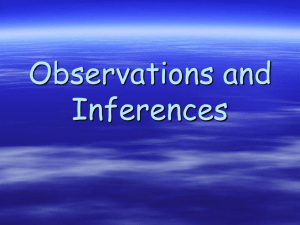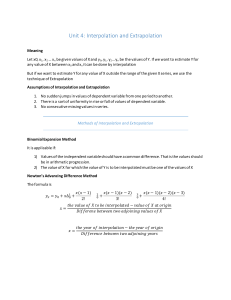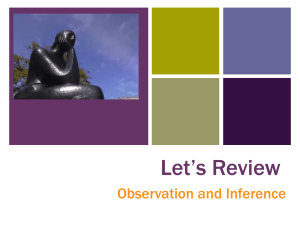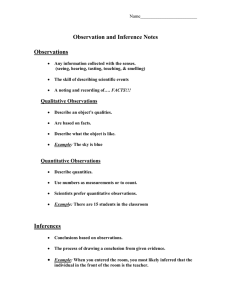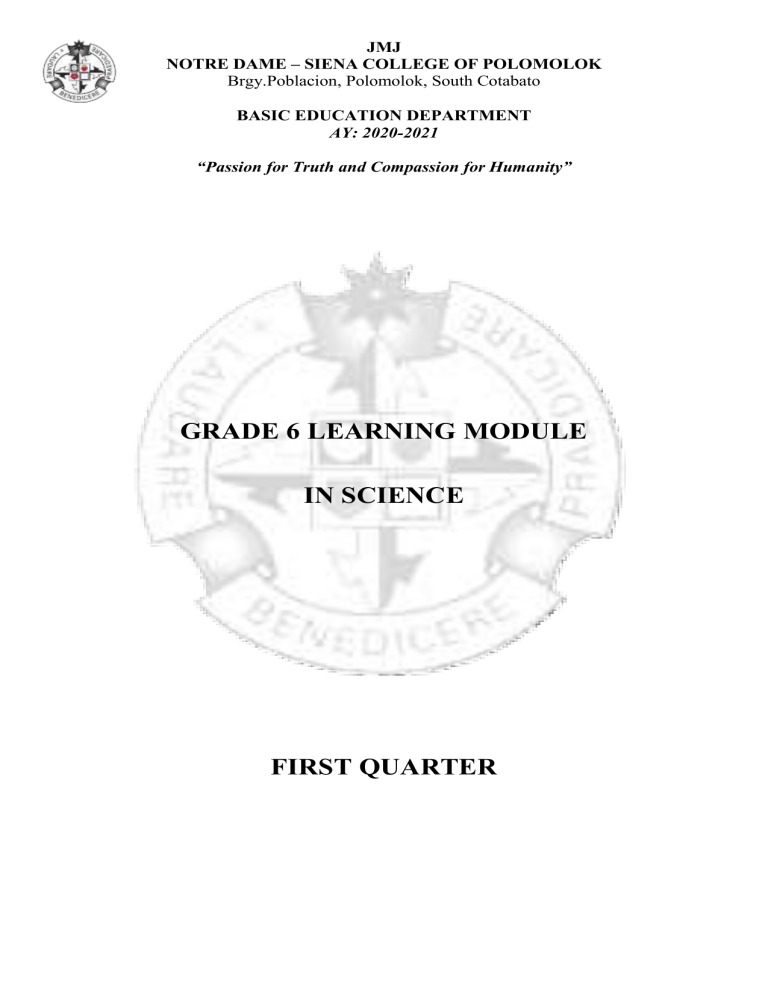
JMJ NOTRE DAME – SIENA COLLEGE OF POLOMOLOK Brgy.Poblacion, Polomolok, South Cotabato BASIC EDUCATION DEPARTMENT AY: 2020-2021 “Passion for Truth and Compassion for Humanity” GRADE 6 LEARNING MODULE IN SCIENCE FIRST QUARTER WEEK 1: AUGUST 24-28, 2020 NAME OF PUPIL: ________________________________________________________ GRADE & SECTION: ______________________________________________________ SUBJECT: SCIENCE 6 TEACHER: MS. AILEEN MAE A. ACLAN MODULE 1: UNDERSTANDING MATTER Introduction and Focus Question Science process skills, scientific attitudes, and scientific method are important tools that scientists possess. These contribute to the great success they experience when conducting experiments or research to have better understanding of matter. The study of nature is the realm of science. There are people who are experts in different fields of sciences: life sciences, physical sciences, earth sciences, and astronomy, among others. These experts are called scientists. Let us find out how scientist think and do science. This unit will help you identify the different scientific attitudes and values that are important in the study of science. It will also help the scientific method while you explore the components of matter through the use of different separation techniques. You will also learn the skills needed in the study of nature. Think about these questions: a. How do scientists work? b. Why are scientific process skills important to be developed? c. How do scientific attitudes help you become a better person? d. How does knowledge of mixtures help us use the substances around us? MODULE COVERAGE This module has the following lessons: Lesson Title You’ll learn to… No. 1 Science Process Skills 1.1 Basic Science Process - Identify and describe the Skills different process skills used in conducting a scientific investigation and an experiment 1.2 Integrated Science Process - Apply integrated science process Skills skills - Relate basic and integrated science process skills 1.3 Scientific Attitudes and - Identify scientific attitudes and Values values - Exhibit scientific attitudes and values 1.4 Scientific Tools - Identify and describe laboratory tools commonly used in science 1.5 Laboratory safety - Identify safety measure in conducting experiment 1.4 Scientific Method - Apply scientific method in planning a simple scientific investigation 2 Classification of Matter Time Frame 5 meetings (1 week) 5 meetings (1 week 5 meetings (1 week) 5 meetings (1 week) 5 meetings (1 week) 5 meetings (1 week) 2.1 Pure Mixtures Substances 2.2 Separating Mixtures and - Distinguish between pure substances and mixtures - Describe the different types of mixtures - Investigate ways of separating mixtures - Explain how separation of mixture takes place 5 meetings (1 week) 5 meetings (1 week) WEEK 1 INVESTIGATE OPENING PRAYER Lord, thank You for this wonderful day. For the gift of new life, family, teachers, sisters and classmates. We ask You to guide us as we learn new things today. We ask this through Christ our Lord. Amen. How are you today? I wish you’re doing well with your family! Before we will go on with our lesson for this week, be a scientist and try to think about this: Why does water fall from the sky? Why is there day and night? Why are birds capable of flying? We may know the answers to these questions now, but long ago, these were mysteries to people. Little by little, as man explored and studied the world around him, he began to discover things and answer questions that bothered him. Science has encouraged man’s natural curiosity about the world around him. And as he asks questions on why things exist and how events happen, Science helps him answer these questions. So what is Science? This lesson will acquaint you with science, the scientists, and the scientific processes. Activity 1 Do and Discover Suppose you want to find out how a tomato plant grows. What steps will you take to find answers to your problem? List down these steps inside the box and complete the statement below. After doing this activity, I discovered that _____________________________________________________________________________ _____________________________________________________________________________ _____________________________________________________________________________ _____________________________________________________________________________ LESSON 1.1 BASIC SCIENCE PROCESS SKILLS There are observable behaviors that demonstrate how you perform the skills of observing, classifying, communicating, measuring, inferring and predicting. Find out if you can demonstrate these behaviors. A. Observing 1. Uses one or more senses to observe objects or events. 2. Makes qualitative observations that describe shape, color, size, and texture using descriptive words. 3. Uses tools like hand lens, microscope, and telescope to observe objects and phenomenon. 4. Uses measuring tools like balance, ruler, meter stick, graduated cylinder, beaker, thermometer, and stopwatch to make quantitative observations. 5. Uses appropriate units of measurements. Have you observed yourself lately? Without further observation, how many these questions can you answer? _________ Are your eyes above, below, or in line with your ears? _________ Do your toenails grow faster than your fingernails? _________ When you fold your hands and interlock your fingers, do you know which thumb of which hand ends up on top? Is it always the same one? _________ Do the moons on your fingernails match the moons on your toenails? _________ What proportion of your overall body length is your head length? How well did you score? If you got more than three out of five, you did extremely well. Many people see but not all are good observers. Observing is the process skill using several or all of the senses- sight, touch, hearing, taste, and smell to describe or to take note of things. When you observe, you look for the characteristics or properties that make something what it is. B. Inferring Suggest explanations of an observation based on past experience. Note: Inference are not always correct. Limited observations. Inaccurate prior knowledge, or misconception may lead to incorrect inferences. Observations Wick of the burning candle becomes black. Inferences Burning of the wick causes formation of carbon. Candle flame moves or flickers. Wind causes the flame to move or flicker. Activity 2 What is the difference between observation and inference? Study the following statements below: It is 2:50 a.m There are nine lights in this hallway. It is 2:50 p.m Two paintings hang on the wall at the end of the hall. A clock is on the wall. This is the hallway of an art gallery. This building is closed. No people are in the hallway. Note which statements are based on the five senses and which are not. 1. Which statements are based on what were observed through the senses? _____________________________________________________________________________ _____________________________________________________________________________ _____________________________________________________________________________ _____________________________________________________________________________ _____________________________________________________________________________ 2. Which statements interpret or explain what were observed? _____________________________________________________________________________ _____________________________________________________________________________ _____________________________________________________________________________ _____________________________________________________________________________ _____________________________________________________________________________ 3. If statements that are based on what was observed through the senses are called observations, what is an observation? _____________________________________________________________________________ _____________________________________________________________________________ _____________________________________________________________________________ _____________________________________________________________________________ 4. What is an inference? _____________________________________________________________________________ _____________________________________________________________________________ _____________________________________________________________________________ To understand more about observation and inference, and to be able to understand their differences, do the activity below. Activity 3 Perform the following activities, then write your observations and inferences on the blanks provided. 1. Rub your hands together, first do it slowly, then rapidly and more vigorously. Observation: _____________________________________________________________________________ Inference: _____________________________________________________________________________ 2. Spray perfume in one corner of the room. Observation: _____________________________________________________________________________ Inference: _____________________________________________________________________________ C. Predicting It is a foretelling the probable outcome or result. It can only be done after a careful analysis of any existing relationship between sets of collected data. Establishing relationships is important in the scientific method. Interpolation is a prediction within the range of given data. Extrapolation is a prediction beyond the range of observable data. Example: It was a weekend. Mario and Eric were out to have some fun at the carnival. They went to the rides and tried some games. As they walked around, Mario saw a fortune teller’s booth. He urged Eric to have their fortune told. Eric refused and said he did not believe fortune tellers could predict the future. He knew what predictions meant. To deepen our understanding about predicting, analyze the table below and answer the following questions that follow. Activity 4 COOLING RATE OF A GALLON OF WATER Time (min) Temperature (〫C) 2 4 6 8 10 12 14 16 18 20 22 24 26 95 90 85 81 77 73 70 67 64 Temperature Drop (〫C) 5 5 5 4 4 4 3 3 3 Answer the following questions. 1. By how much did the temperature drop in the first six minutes? _____________________________________________________________________________ 2. By how much did the temperature drop in the following six minutes? _____________________________________________________________________________ 3. By how much did the temperature drop in the third six minutes? _____________________________________________________________________________ 4. What was the temperature of the water after 13 minutes? __________________________________________ After 15 minutes? _____________________________________________ 5. When you predicted the temperature of the water after 13 and 15 minutes, you were interpolating. What is interpolation? _____________________________________________________________________________ _____________________________________________________________________________ _____________________________________________________________________________ 6. Did you see a pattern in the way the water cold? _________________________________________________ 7. What do you think would be the temperature of the water a. after 20 minutes? ______________________________ b. after 22 minutes? ______________________________ c. after 24 minutes? ______________________________ d. after 26 minutes? ______________________________ 8. When you predicted the temperature of the water after 20, 22, 24, and 26 minutes, you were extrapolating. What is extrapolation? _____________________________________________________________________________ _____________________________________________________________________________ _____________________________________________________________________________ - To further enrich our knowledge on interpolation and extrapolation, answer the activity 5. Activity 5 The table below show the relation of the hourly wage to the number of hours worked. Study it carefully, then answer the questions that follow. HOURLY WAGE OF AN EMPLOYEE Hourly Wage (in Pesos) 315.00 280.00 245.00 210.00 175.00 140.00 105.00 70.00 35.00 Number of Hours 9 8 7 6 5 4 3 2 1 1. How much is earned in a. three hours? __________________________________________________ b. four hours? __________________________________________________ c. eight hours? _________________________________________________ 2. How many hours must one work to earn 140.00 Php? ______________________ 3. By interpolating, predict how much one will earn in a. two hours and thirty minutes. ____________________________________________________ b. three hours and thirty minutes. ___________________________________________________ c. four hours and thirty minutes. ____________________________________________________ 4. If an employee works eight hours a day, predict by extrapolation how much he will earn in a. two days. ___________________________________________________ b. four days. ___________________________________________________ c. five days. ___________________________________________________ 5. Aware of the present cost of living, suggest ways of increasing one’s income. _____________________________________________________________________________ _____________________________________________________________________________ _____________________________________________________________________________ _____________________________________________________________________________ _____________________________________________________________________________ _____________________________________________________________________________ 6. Differentiate interpolation and extrapolation. _____________________________________________________________________________ _____________________________________________________________________________ _____________________________________________________________________________ Experiments are done through investigations which are carefully planned and every possible angle is considered. Observations are gathered with great care and accuracy. Evidences are weighed carefully before drawing conclusions. - Great job! You’re doing well. Let’s now end our lesson with a closing prayer. CLOSING PRAYER Glory be to the Father, and to the Son, and to the Holy Spirit, as it was in the beginning is now and will be forever. Amen. Prepared by: Checked by: Ms. Aileen Mae A. Aclan Subject Teacher Ms. Loren Jean Oria SATL Noted by: Mr. Luis A. Berro Academic Coor. Approved by: Sr. Fedelyn N. Bueno, OP Principal
